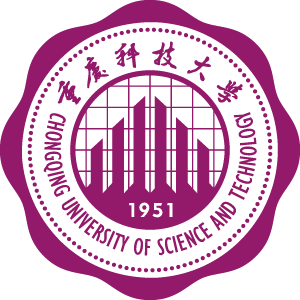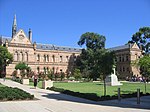Related Research Articles

The University of Adelaide is a public research university located in Adelaide, South Australia. Established in 1874, it is the third-oldest university in Australia. The university's main campus is located on North Terrace in the Adelaide city centre, adjacent to the Art Gallery of South Australia, the South Australian Museum, and the State Library of South Australia.

Cranfield University is a British postgraduate public research university specialising in science, engineering, design, technology and management. Cranfield was founded as the College of Aeronautics (CoA) in 1946. Through the 1950s and 1960s, the development of aircraft research led to growth and diversification into other areas such as manufacturing and management, and in 1967, to the founding of the Cranfield School of Management. In 1969, the College of Aeronautics was renamed the Cranfield Institute of Technology, was incorporated by royal charter, gained degree awarding powers, and became a university. In 1993, it adopted its current name.
Santos Ltd. is an Australian energy company, the country's second-largest independent oil and gas producer. In the 2020 Forbes Global 2000, Santos was ranked as the 1583rd-largest public company in the world.
The Australian Research Council (ARC) is the primary non-medical research funding agency of the Australian Government, distributing more than A$800 million in grants each year. The Council was established by the Australian Research Council Act 2001, and provides competitive research funding to academics and researchers at Australian universities. Most health and medical research in Australia is funded by the more specialised National Health and Medical Research Council (NHMRC), which operates under a separate budget.

Geoscience Australia is an agency of the Australian Government. It carries out geoscientific research. The agency is the government's technical adviser on all aspects of geoscience, and custodian of the geographic and geological data and knowledge of the nation.
The Jackson School of Geosciences at The University of Texas at Austin unites the Department of Geological Sciences with two research units, the Institute for Geophysics and the Bureau of Economic Geology.

The Building Research Establishment (BRE) is a centre of building science in the United Kingdom, owned by charitable organisation the BRE Trust. It is a former UK government national laboratory that was privatised in 1997. BRE provides research, advice, training, testing, certification and standards for both public and private sector organisations in the UK and abroad. It has its headquarters in Garston, Hertfordshire, England, with regional sites in Glasgow, Swansea, the US, India, the Middle East and China.

The Gubkin Russian State University of Oil and Gas is a public university in Moscow, Russia. The university was founded in 1930 and is named after the geologist Ivan Gubkin. The university is colloquially known as Kerosinka, meaning 'kerosene stove'.

Chongqing University of Science and Technology is located in Shapingba District of Chongqing City, by the Chongqing Municipal People's government and the China National Petroleum Corporation, China Petrochemical Corporation, China National Offshore Oil Corporation, named "Excellence Engineer Education Program", "Data China 100 School Project", is a mainly, petroleum and chemical industry, metallurgy, machinery and materials with electronics, safety and environmental protection features, covering science, engineering, economics and management, law, literature and art of the multidisciplinary coordinated development of full-time public universities.

Pandit Deendayal Energy University (PDEU), formerly Pandit Deendayal Petroleum University (PDPU), has been established by GERMI as a Private University through the State Act enacted on 4 April 2007. The university is located at Raysan village of Gandhinagar city in an area known as Knowledge Corridor, and it is near the GIFT City. It is 8 km from Gujarat state capital Gandhinagar, and 23 km from Gujarat's largest city Ahmedabad.

The IFP School is a graduate engineering school located in Rueil-Malmaison, France. Founded in 1954, IFP School is part of the IFP Energies nouvelles (IFPEN), a French public-sector research and training center. The school graduates approximately 600 students per year in 20 graduate programs, employing 40 regular professors and 350 instructors from industry.
The Australian Petroleum Production and Exploration Association, known as APPEA, is an Australian industry association representing companies which explore and produce oil and gas in Australia. APPEA is a non-profit organisation.
The University of Energy and Natural Resources is a public-funded university in Ghana, that was established by an Act of the Parliament of Ghana, Act 830, 2011 on December 31, 2011. The University is a public funded national institution which seeks to provide leadership and management of energy and natural resources and be a centre of excellence in these critical areas. The University approaches its programmes and research emphasizing interdisciplinary collaboration and taking into account, areas such as economics, law and policy, management, science, technology and engineering as well as social and political issues affecting energy and natural resources.
The Resources Industry Development Board (RIDB) was formed in 2000 to enhance the growth of the state of South Australia's mineral and petroleum resources sector and its contribution to the state's economy. It was formed in response to recommendations of the Resources Task Force made the previous year. The RIDB provided advice to the Minister for Mineral Resources and Energy and the state government. There was a high degree of inter-activity with the Primary Industries and Regions SA (PIRSA) Division of Minerals and Energy which also provided the Board's secretariat.
Ian Geoffrey Gould is a former Chancellor of the University of South Australia (2008–2015) and former Managing Director (Australia) of Rio Tinto Group. Gould is considered to be one of South Australia's most influential people.
The Institute for Mineral & Energy Resources (IMER) is the point of contact at the University of Adelaide for strategic research interests related to mineral and energy resources. It was founded in 2009 and launched h Australian Minister for Mineral Resource Development, Paul Holloway on 5 October 2010. The institute attracted over $18.5 million in research funding and corporate sponsorship in its first year. The IMER facilitates collaborative research between the higher education sector and industry and can take the shape of project collaboration to meet a company's specific needs, consultancy utilising academic researchers and PhD students, organisational collaboration to leverage government funding and long-term partnerships offering mutual benefits.
UCL Australia was an international campus of the University College London, located on Victoria Square in Adelaide, South Australia. It had three parts: the School of Energy and Resources (SERAus), the International Energy Policy Institute (IEPI) and a branch of UCL's Mullard Space Science Laboratory. UCL Australia described its university community as "welcoming, dynamic and influential." The campus closed in December 2017.
Science and technology in Uganda examines government efforts to develop a national innovation system and the impact of these policies.
References
- ↑ "Australian School of Petroleum - About - History". University of Adelaide. University of Adelaide. Retrieved 8 February 2015.
- ↑ "News & events - $25 million Santos sponsorship a major boost for industry". University of Adelaide. 13 August 1999. Retrieved 8 February 2015.
